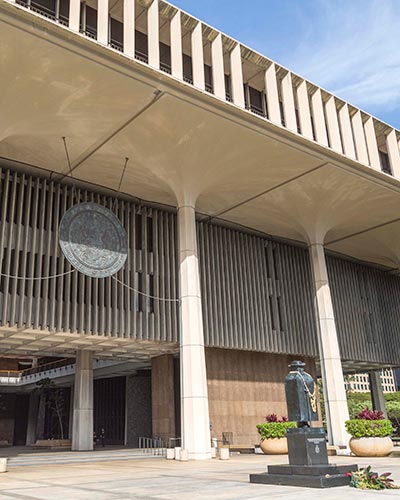Of all the questions in the world – who, what, where, when, why – it may be “how” that’s most challenging to address. For example, how to safely reopen schools in the wake of COVID-19? How are backlogged ports and supply chain issues raising prices on store shelves? The answers are key to research in the social sciences.
“For many, understanding science from a scientific perspective is easy. But how do you put that into action for the benefit of the community?” asked Denise Eby Konan, dean of the College of Social Sciences. “The answer can often be found in the social sciences, which is the bridge connecting science with its impact on people.”
Throughout 2021, CSS served as a reliable bridge providing Hawaiʻi’s leaders with unique perspectives in key areas. It enabled them to make more informed, compassionate and socially responsive policy and business decisions in areas including health, policy and the economy, and sustainability.
Health
SARS-CoV-2 continued to dominate the news in 2021, with the rise of the deadly Delta variant and later, Omicron. Research focused on efforts to control the spread of infections, particularly in groups with significant gaps in vaccine administration. These researchers included:
- Economics’ Ruben Juarez, who has been one of the leaders of the Pacific Alliance Against COVID-19 project’s approach to mitigate COVID-19 disparities in Hawaiʻi’s vulnerable populations. The project resulted in a safer school reopening model that has now expanded to some of the hardest-hit areas in the state, thanks to a $3 million award from the National Institutes of Health.
- Sociology’s Wei Zhang and Margie Walkover, who released a trio of research papers studying COVID’s higher psychological distress impacts on various groups and those with lower household incomes. Utilizing survey data, the researchers recommended solutions to address the economic, political and environmental factors shaping health.
- Social Science Research Institute’s (SSRI) Jack Barile and Economics’ Juarez, along with researchers from other Mānoa units. They identified common hesitations to vaccination and provided recommended communication strategies to address them in a CSS webinar presented in partnership with First Insurance Company of Hawaiʻi.
- SSRI’s Barile, who convened a Health Policy Initiative Kickoff summit to begin the quest to get people from different specializations to think out of the silo. The journey has begun to establish a single entity to leverage and share health research data to provide better care for the public, and positively impact legislation and policy.
Policy and Economy
The College proved to be a trusted source for independent research and analysis for media and the public on questions about public policy and the economy. Major contributors included:
- UHERO’s Economic Pulse, a weekly coincident index of economic activity in Hawaiʻi, that provided insights into the local economy and recovery.
- UHERO’s economic forecasts, which provided analysis of economic trends in Hawaiʻi and the Asia-Pacific region.
- Various researchers within the Public Policy Center, which authored papers on resident attitudes on destination management, restaurant owners and resident assessments on lockdown.
Society
The College continued its work throughout 2021 to understand and address issues that impacted Hawaiʻi and the society at large. For example:
- Urban and Regional Planning’s Priyam Das guided practicum students in a PLAN 751 class as they engaged with Waimānalo organizations, groups and stakeholders and conducted a comprehensive assessment of its food system. They also developed recommended actions to create an integrated, sustainable food system in the ahupua‘a of Waimānalo.
- Sociology’s Zhang and Omar Bird, Psychology’s Anna Pruitt and Brad Nakamura, and SSRI’s Barile addressed hunger and food insecurity among Hawaiʻi’s families.
Climate Change and Sustainability
High on the College’s priority list of relevant research was protecting the environment from the effects of climate change. For example:
- Geography and Environment’s Camilo Mora joined Nobel Laureate and former U.S. Vice President Al Gore for a scientist question-and-answer panel on global warming.
- Urban and Regional Planning’s Karl Kim continues to lead the effort to expand work on disaster risk-reduction initiatives in Indonesia, including climate change, sea-level rise, volcanoes and other threats.
- Geography’s Dave Beilman, part of a multidisciplinary team of scientists, released research highlighting the vital role that wetlands play in mitigating climate change and the need for wetland preservation. Beilman’s research also focused closer to home: Joined by the department’s Charly Massa, the duo are studying peatland sediment in Hawaiʻi to help build a better understanding of past global temperatures.
